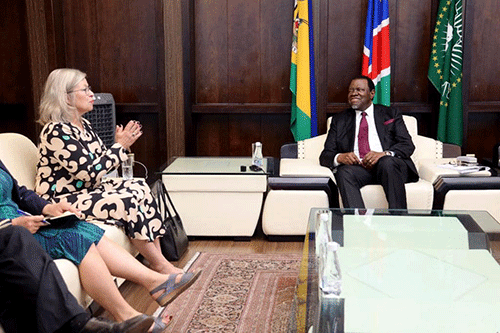Namibia and the European Union (EU) are soon expected to ink a memorandum of understanding that eyes building strategic and sustainable mineral and green hydrogen value chains. This is according to EU Ambassador to Namibia, Sinikka Antila, who paid a courtesy call on President Hage Geingob at State House on Friday.
Antila said the desire is to have the memorandum of understanding (MoU) signed during the UN Climate Change Conference, widely known as COP 27, scheduled to take place in Egypt during November 2022.
“The MoU is to enhance economic diversification, creating value chains on strategic minerals in Namibia, meaning you can earn more from your own resources. It can create jobs and drive economic growth, and at the same time you can export those products to the international market,” the EU Ambassador noted.
On green hydrogen, she added that Europe needs renewable energy sources and needs strategic minerals as these are essential elements to implement their own green transition. Antila said the impending agreement is a win-win situation for both parties, as Namibia is to develop its own value chains.
“On minerals, we are talking about rare earth minerals. You are a mineral country. You just need research on which minerals are the most needed ones. This is where the two (governments) can work together. After the signing, we have to come up with a concreate road plan that needs to be implemented,” the ambassador observed.
Green hydrogen and ammonia are articulated in the second Harambee Prosperity Plan’s economic advancement pillar as a transformative strategic industry. Furthermore, in July 2022, international news agency Reuters reported on Namibia’s possible hydrogen deal with the EU.
They quoted director general of the National Planning Commission, Obeth Kandjoze, as saying “work was underway for a deal on green hydrogen”.
The German government has already agreed to invest over N$685 million (40 million euros) in Namibia’s green hydrogen sector, while Belgian and Dutch companies are also operating in Namibia in this field.
On Friday, Geingob said he was confident that Namibia’s future looks bright after the new engines of growth of green hydrogen and oil discoveries were pronounced in the country.
“Since 2015, the country experienced severe drought and economic downturn, not to mention the Covid-19 impact. So, it has been seven years of crisis management, but we see light at the end of the tunnel,” the President noted.


